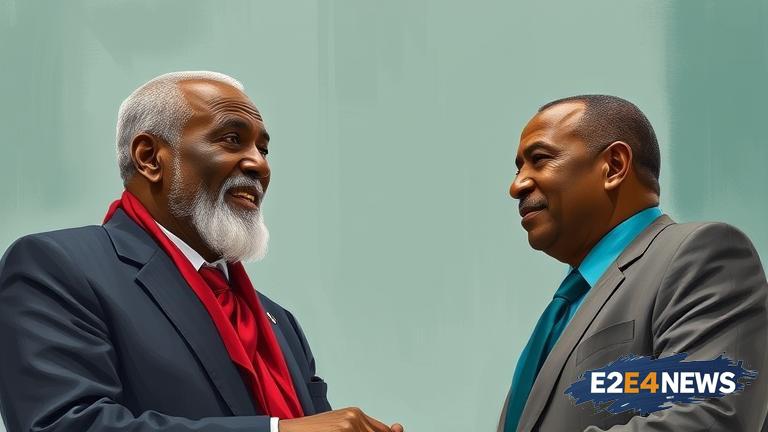In a surprise move, Somalia’s President Hassan Sheikh Mohamud has reached an electoral deal with a key opposition faction, led by former President Sharif Sheikh Ahmed. The agreement, announced on Tuesday, aims to reform the country’s electoral system and pave the way for long-delayed elections. However, the deal has sparked division and uncertainty among Somalis, with some hailing it as a major breakthrough and others criticizing it as a power-sharing pact that undermines the country’s democratic principles. The opposition faction, which has been a vocal critic of the government, has agreed to support the president’s electoral reforms in exchange for greater representation in the government. The deal has been welcomed by some as a step towards stability and security in the war-torn country, but others have expressed concerns that it may exacerbate existing divisions and create new tensions. Somalia has been struggling to recover from decades of conflict and instability, and the country’s electoral system has been a major point of contention. The current system, which is based on clan representation, has been criticized for being undemocratic and favoring certain groups over others. The president’s deal with the opposition faction aims to introduce a more representative system, but critics argue that it may not address the underlying issues and could lead to further instability. The international community has been watching the developments in Somalia with keen interest, and the United Nations has welcomed the deal as a positive step towards peace and stability. However, some analysts have warned that the deal may not be sustainable in the long term and could lead to further conflict. The Somali people have been eagerly awaiting the outcome of the electoral reforms, and many are hoping that the deal will pave the way for free and fair elections. However, others are skeptical, citing the country’s history of electoral irregularities and the lack of trust in the government. The president’s deal with the opposition faction has also sparked concerns about the role of external actors in Somalia’s politics, with some accusing neighboring countries of interfering in the country’s internal affairs. Despite these challenges, the Somali government has expressed optimism that the deal will help to bring stability and security to the country. The president has pledged to work with all stakeholders to ensure that the electoral reforms are implemented in a fair and transparent manner. However, the road ahead will be challenging, and the Somali people will be watching closely to see if the deal will deliver on its promises. The international community will also be monitoring the situation closely, and the United Nations has urged all parties to work together to ensure that the electoral reforms are successful. In the meantime, the Somali people will continue to wait with bated breath to see if the deal will bring about the change they have been hoping for. The country’s future hangs in the balance, and the outcome of the electoral reforms will have far-reaching consequences for the Somali people and the region as a whole. As the situation continues to unfold, one thing is clear: the Somali people deserve a fair and democratic system, and it is up to the government and the international community to ensure that this happens. The deal has also sparked a heated debate about the role of clan politics in Somalia, with some arguing that the system is outdated and needs to be reformed. Others have argued that the clan system is an integral part of Somali culture and should be preserved. The president’s deal with the opposition faction has also raised questions about the future of Somali politics, with some speculating that it could pave the way for a new era of cooperation and stability. However, others have warned that the deal may not be enough to address the country’s deep-seated problems and could lead to further instability. As the Somali people look to the future, they will be hoping that the deal will bring about the change they have been hoping for, but they will also be aware of the challenges that lie ahead. The international community will be watching closely to see if the deal will deliver on its promises, and the United Nations will be working closely with the Somali government to ensure that the electoral reforms are successful. In the end, the success of the deal will depend on the ability of the Somali government and the opposition faction to work together and deliver on their promises. The Somali people will be waiting with bated breath to see if the deal will bring about the change they have been hoping for, and the international community will be monitoring the situation closely to ensure that the country’s fragile democratic process is protected.
